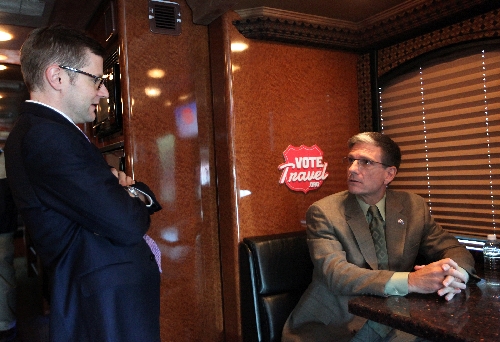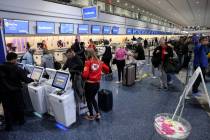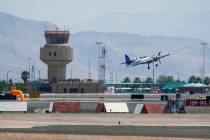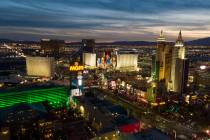Wanted: More international visitors to U.S.

The U.S. is competing on a global scale for business. And it’s losing.
While worldwide long-haul international travel grew by 40 percent between 2000 and 2010, the United States market share dropped from 17 percent to 12 percent.
“We know we are losing business to other countries,” said U.S. Rep. Joe Heck, R-Nev.
Heck climbed aboard the U.S. Travel Association’s 2012 Vote Travel campaign tour bus in Henderson on Wednesday to talk about how he thinks the $1.9 trillion travel and tourism industry can again become a player.
“This is a part of a $4 million to $5 million campaign to promote the travel and tourism industry in the United States,” said Robert Bobo, spokesman for the U.S. Travel Association, a national nonprofit organization that promotes the industry.
In September, Heck introduced the Welcoming Business Travelers and Tourists to America Act to Congress, which was assigned to a congressional committee in September. The bill has 39 co-sponsors, including Rep. Mark Amodei, R-Nev., and Rep. Shelley Berkley, D-Nev.
The bill aims to increase the number of international visitors from countries such as China or Brazil, whose citizens are required to have a nonimmigrant visa before entering. By setting a standard wait time of 12 days for visa application interviews and implementing teleconferencing for the initial visa interview, Heck said long wait times, which sometimes can be up to 90 days, should be eliminated.
“We’ve heard we were losing convention business here because folks from those countries wanted to plan for a business trip but they couldn’t get their visa in time to get here,” Heck said. “I think 12 days is critically important.”
In 2011, 62.3 million international travelers visited the U.S., according to data from the Office of Travel and Tourism Industries. International travel to the United States generates more than $134 billion annually in exports and supports 1.8 million United States jobs.
“We know that for every 35 international travelers that are in the United States, that creates one U.S. job. It’s a significant boost to the economy,” Bobo said.
So it stands to reason that drawing more international travelers to the U.S. isn’t just on Heck’s mind.
On Monday, President Barack Obama and Brazilian President Dilma Rousseff met and committed to work together so that Brazil can join the U.S. Visa Waiver Program.
Secretary of State Hillary Clinton also announced the State Department would open new consulates in Belo Horizonte and Porto Alegre, Brazil, which should help reduce wait times.
“The State Department has done a very good job of getting wait times down in both Brazil and in China. We’ve been very encouraged to see those wait times decline,” Bobo said.
In China, wait times have dropped from 90 days to less than a week as consular staff has been added and business hours expanded. More customer service windows are also being added in consulates in Brazil.
Heck acknowledged the reduction in wait times, but said more needs to be done.
“Part of it isn’t just the delay in getting to the interview, it’s the distance. In some countries like China, somebody might have to travel two days to a consulate to do their interview,” Heck said.
Thus, the teleconferencing aspect of his legislation. Heck’s bill also directs the Secretary of State to use non-immigrant visa fees to hire more consular officers and build additional infrastructure in China, Brazil and India.
But, the bottom line for Heck and for the U.S. Travel Association is attracting more international travelers.
“If it’s easier for a business traveler to go to a trade show that’s in Europe, and he can get a visa there in 72 hours, he’s going to say, ‘I should just go there. Why should I wait six months to go to Las Vegas?'” Heck explained.
Contact reporter Laura Carroll at lcarroll@reviewjournal.com or 702-380-4588.


















